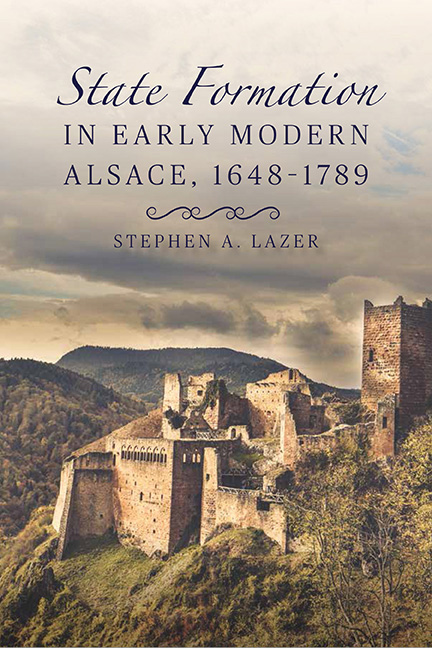Book contents
4 - Confessionalization, Multiconfessionalism, and Administration
Published online by Cambridge University Press: 31 August 2019
Summary
In 1740, the villagers of Petersbach in the County of Lützelstein complained to Duke Christian IV of Pfalz-Zweibrücken that the bailiff, Sebastien de Fouquerolle, had named an illiterate pig herder as mayor. Unfortunately, the alleged pig herder was the only Catholic available for the position, and the French monarchy required that all mayors be Catholic, even in this overwhelmingly Protestant territory. Indeed, most major officials in Alsace—and not only bailiffs—had to be Catholic. De Fouquerolle's hands were tied. This awkward situation, in which a Protestant duke had to appoint Catholic officials in communities whose Christian inhabitants were mostly or even wholly of Protestant confessions, pertained because Lützelstein lay in French Alsace.
The Thirty Years War had supposedly ended confessional battles in Europe; this was not true. Confession remained critical in both Germany and France in the post-Westphalian period, and nowhere was this truer than where they met in Alsace. Confession quickly emerged as an important marker of political authority following the French conquest of Alsace, particularly in Protestant territories like those ruled by the Birkenfelds. This chapter analyzes the confessional struggles between the French monarchy, its provincial institutions, and the duchy of Pfalz-Zweibrücken in the majority-Protestant Alsatian territories of the duchy over the course of the late seventeenth and eighteenth centuries, essentially from the point at which they accepted French sovereignty. Doing so deepens our understanding of the interplay of confession and politics at the local and regional levels in French, German, and Alsatian contexts and contributes to ongoing historical debates surrounding the confessionalization process.
The Alsatian case is of particular interest because, like the rest of the Holy Roman Empire, Alsace's confessional map had largely stabilized by 1620, the traditional endpoint of the confessionalization process. Yet what had ended in Alsace was just heating up in France. France's confessional program in Alsace, especially under Louis XIV, went beyond royal support for Catholicism, although that persisted as an important source of legitimacy for the monarchy. The ideal of one king, one faith, one law served as a bedrock justification for the monarchy and eventually led to Louis XIV's revocation of the edict of Nantes and thus the suppression of Huguenot worship.
- Type
- Chapter
- Information
- State Formation in Early Modern Alsace, 1648–1789 , pp. 114 - 151Publisher: Boydell & BrewerPrint publication year: 2019



